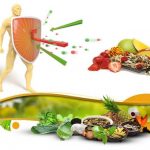What to do to boost your immune system and prevent infections caused by bacteria and viruses. Here are the 14 natural ways of boosting your immune system. Enjoy reading…
1. DIET: The most important factor in boosting your immune system. Following a diet rich in antioxidants is essential to supporting your immune system. Abundant in many fruits and vegetables, antioxidants combat free radicals (chemical by-products known to damage DNA and suppress the immune system). Large doses of vitamin C – 1000 mg or more daily has anti-viral and immune enhancing effects. Mega doses above and beyond bowel tolerance (dose that produces diarrhea) are given intravenously to fight serious infections like Lyme disease as well as cancer. The only significant issue with the use of high dose vitamin C beyond the recommended daily allowance levels is the diarrhea side effect. Backing off the dose should resolve this problem. Choosing healthy fats (such as the omega-3 fatty acids available in oily fish, flaxseed, and krill oil) over saturated fats (found in meat and dairy products) may help increase your body’s production of compounds involved in regulating immunity. For an additional immune boost, try adding garlic (shown to possess virus-fighting and bacteria-killing properties) and ginger (a natural anti-inflammatory) to your meals on a regular basis. Drinking plenty of water and steering clear of sugary beverages, like soda and energy drinks, may also help fend off infection by flushing out your system.
2. EXERCISE:Working out regularly can mobilize your T cells, a type of white blood cell known to guard the body against infection. Moderate exercise, such as brisk walking for an average of 30 minutes daily can decrease risk of colds by even 50%. Regularly engaging in intense, vigorous activity like running, on the other hand, may weaken your immune function and leave you more susceptible to viral infections. However, animal-based research suggests that supplementing with the antioxidant quercetin could reduce flu risk among athletes.
3. STRESS REDUCTION: Another way of boosting your immune system. Chronic stress can have a negative impact on immunity. Scientific studies indicate that while short-term exposure to stressors can increase your immune defense, prolonged stress may wear down the immune system and increase your vulnerability to illness. To keep your stress in check, incorporate a relaxing practice like meditation, yoga, or deep breathing into your daily routine. Or try tai chi, a gentle Chinese martial art found to increase immune defense against shingles in older adults.
4. SLEEP AND HYGIENE: Simply keeping your hands clean is one of the best ways to ward off illness, according to the USA Centers for Disease Control and Prevention. Make sure to wash your hands for 15 to 20 seconds (using warm water and soap) before preparing food or eating and after coughing, sneezing, using the bathroom, or touching public surfaces. Another healthy habit vital to preventing sickness is getting a full eight hours of sleep each night, which may help regulate immune function.
5. MELATONIN: Melatonin supplements are widely recommended for various sleep conditions. A naturally-occurring hormone that regulates the sleep-wake cycle in the brain, melatonin is produced from serotonin when exposure to light decreases at night. It is used in conditions where sleep is disordered due to low levels of melatonin at night such as aging, affective disorders (e.g. depression), delayed sleep-phase disorder, or jet lag. Melatonin supplements may improve sleep quality and morning alertness in older adults with insomnia.
6. MEDITATION: A regular meditation practice may help to promote sleep by slowing breathing and reducing stress hormone levels. Meditation is a technique that involves consciously directing one’s attention to an object of focus, such as breathing or a sound or word, in order to increase awareness of the present, relaxing the body, and calming the mind. Some types of meditation include guided meditation, vispassana meditation, yoga nidra, or body scan.
7.VISUALIZATION: Involves actively imagining a relaxing scene. You can try it in bed for 20 minutes before falling asleep. Involve all your senses. If you’re imagining yourself on a tropical island, think of the way the warm breeze feels against your skin. Imagine the sweet scent of the flowers, look at the water and listen the waves. The more vivid the visualization and the more senses you involve, the more effective it will be.
8. LIMIT YOUR INTAKE OF CAFFEINE, ALCOHOL, AND NICOTINE – Caffeine and nicotine can have a pronounced effect on sleep, causing insomnia and restlessness. In addition to coffee, tea, and soft drinks, look for hidden sources of caffeine such as chocolate, cough and cold medicine, and other over-the-counter medicine. Alcohol consumption can result in nighttime wakefulness.
9.CUT BACK ON SUGAR – Although sugar can give a burst of energy, it’s short-lived and can cause uneven blood sugar levels. This can disrupt sleep in the middle of the night as blood sugar levels fall.
10.EAT FOODS THAT HELP YOU SLEEP – Tryptophan is a naturally-occurring amino acid that is a precursor to serotonin, which is then converted to melatonin. Eat carbohydrate snacks such as whole grain crackers before bedtime. Also include foods rich in vitamin B6, found in wheat germ, sunflower seeds, and bananas, which enhances the body’s conversion of tryptophan.
11. EAT MAGNESIUM-RICH FOODS – The mineral magnesium is a natural sedative. Deficiency of magnesium can result in difficulty sleeping, constipation, muscle tremors or cramps, anxiety, irritability, and pain. Foods rich in magnesium are legumes and seeds, dark leafy green vegetables, wheat bran, almonds, cashews, blackstrap molasses, brewer’s yeast, and whole grains. In addition to including these whole foods in your diet, you can also try juicing dark leafy green vegetables.
12. PROBIOTICS: They are friendly bacteria that usually inhabit the gut and are a very well documented optimizer of the immune system. Seventy percent or more of our immune system is controlled by what happens in the gut, and friendly bacteria are the most important component of that immune system. These bacteria modulate the immune system by increasing the numbers of certain while blood cells (T lymphocytes). Probiotics also help improve digestion and protect the body from harmful pathogens such as candida albicans. Probiotics can be found in supplements, fermented vegetables, locally fermented African foods (Daddawa) or in fermented dairy products.
13. ECHINACEA – 1000 mg or more daily is well documented as an immune system booster used to both prevent and treat a long list of infections. It is often said that Echinacea should not be taken for long periods of time beyond a few weeks, but this has never been proven to be detrimental in any way. This false advice on limiting the length of time that one should be using Echinacea originates from a German study that actually said the opposite. Things are often lost in translation. The bottom line is that one can supplement Echinacea continuously for years without concerns. The other Echinacea myth is that people who have autoimmune disease should not be taking it due to over-stimulation of their autoimmune disease. This too is nonsense since supplementing with Echinacea increases the body’s production of hyaluronic acid, a well-known anti-inflammatory pain reliever. Once again, to be healthier with autoimmune disease, take Echinacea in large doses. (Caveat: If you have a ragweed allergy you might react adversely to Echinacea because it belongs to the same plant family).

Credit: Daily Times
14. VITAMIN D: If you have adequate blood levels of Vitamin D it is possible to prevent any and all infections. The trouble is that one has to get enough sunshine in order for the body to manufacture sufficient vitamin D through the action of ultraviolet light on the skin. This may be very difficult to achieve during the winter months in Europe, USA and Canada. Hence, regular oral supplementation of emulsified vitamin D drops is almost mandatory in these countries.CHECK YOUR BLOOD LEVELS BEFORE SUPPLEMENTING WITH VITAMIN D. The optimal average adult dose is between 5000 and 10,000 IU daily. If you happen to have a cold or flu at the moment, it is recommended that you take 50,000 IU of Vitamin D daily for 3-7 days and then drop the dose back to somewhere between 5 and 10,000 IU daily, depending on your blood levels of 25-hydroxy vitamin D. The reason why vitamin D helps with just about any kind of infection is because it stimulates the production of cathelicidin, a protein with natural antibiotic properties.
Planning of boosting your immune system? Try out the above information.
These are the thoughts of:
Sa’eed Halilu Bawa
Senior Lecturer (Associate Professor) at University of the West Indies, St. Augustine Campus, Trinidad.
Studied Food and Nutrition Sciences, Dietetics at Kaduna Polytechnic, Nigeria; Warsaw University of Life Sciences, Poland.
























